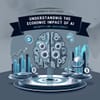As artificial intelligence (AI) continues to advance, its potential to reshape the global economy becomes more apparent. While AI promises significant benefits, from enhancing productivity to driving innovation across various sectors, it also raises important questions about its broader impact. Industries like healthcare, finance, and manufacturing have already seen AI streamline processes, improve decision-making, and reduce costs. This technological transformation allows businesses to become more efficient, create new opportunities, and boost growth by automating routine tasks, enabling human workers to focus on more complex, creative roles.
However, the rapid expansion of AI also poses challenges, particularly when it comes to the future of work. As machines take over repetitive tasks, millions of jobs could be displaced, especially in sectors like customer service, transportation, and manufacturing. For instance, self-driving technology could significantly reduce the need for truck drivers, while AI-powered software is already handling administrative duties traditionally performed by clerks and office workers. This shift underscores the need for urgent measures to retrain the workforce and equip workers with the skills required for emerging roles in technology and data science.
In addition to concerns about job displacement, there’s the issue of growing inequality. While wealthier individuals and countries are more likely to benefit from AI’s advancements, those in less developed regions or lower-income brackets may struggle to access its benefits. The “digital divide” between nations and social groups could widen, as those without the infrastructure or resources to implement AI will be left behind. For this reason, governments and international bodies must take action to ensure AI is used to promote equity, making sure that its benefits are accessible to all and not just the privileged few.
The economic implications of AI will be shaped by how well society addresses its challenges. While AI holds immense promise in boosting economic growth and enhancing quality of life, its integration into the workforce must be handled with care. Policymakers will need to implement strategies to support displaced workers, reduce inequality, and ensure that AI is developed responsibly. If these challenges are met with thoughtful solutions, the future of AI could offer widespread benefits, creating a more inclusive and prosperous global economy.


